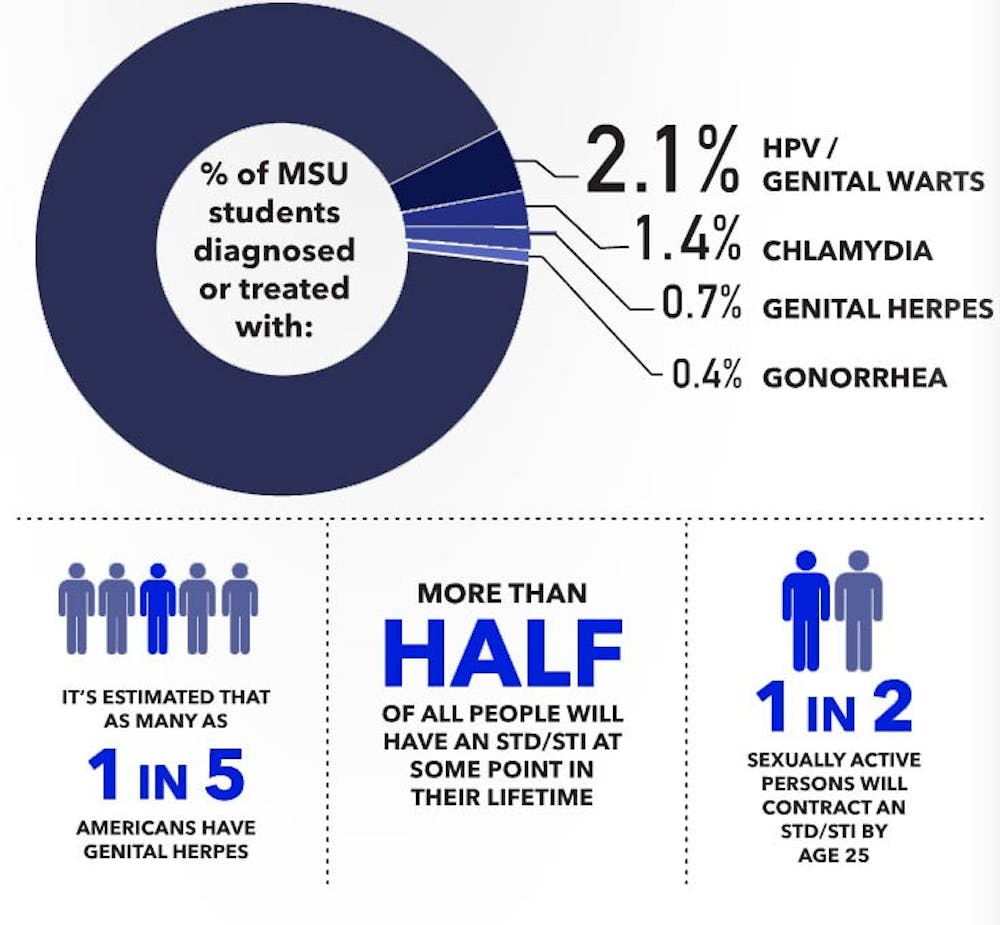“It won’t happen to me.”
College students are prone to thinking that whether they’ve had a one-night stand with someone they met two hours ago at Rick’s American Cafe, or they’re in a committed, long-term relationship, they are immune to sexually transmitted diseases or infections.
But the truth is, no one is completely immune from disease or infection unless they practice abstinence.
Not everyone practices abstinence, so it’s important to be educated on how to practice safe sex in order to minimize the risk of being infected as much as possible.
Anna, an MSU senior who opted to remain anonymous, said she contracted genital herpes during freshman year from her partner, who was unaware he had the disease.
“It makes you more aware of people and you want to make sure you get tested together before you start to do anything,” Anna said.
There are many different resources available for students to help them make sure they are protecting themselves properly from STDs, STIs and pregnancy.
Among these are the Student Health Advisory Council, which is a student group affiliated with Olin Health Center.
Secretary of SHAC and biochemistry and molecular biology senior Steve Cullen said the group talks about healthy relationships and education on sexual well-being.
“There are different myths and facts about sexual health in the community,” Cullen said.
Even when using protection, there is the possibility of contracting a disease from skin-on-skin contact, which is what Anna said happened to her.
“Protected sex is the best form of protection but that didn’t help,” she said.
If it’s too late to make choices which prevent contracting an STD or STI, having resources available to help prevent future infections or treat current ones is also a priority.
According to MSU Student Health Services, 44 percent of students reported having only one sexual partner in the year before they responded to the survey.
April marks STD Awareness Month, which reinforces the importance of education on how to prevent diseases in addition to knowing the steps to take to get treatment and support a future healthy lifestyle when one has already been contracted.
Knowing the facts
When someone gets sick with a cold or the flu, there are symptoms which indicate something is wrong.
But the opposite is true for some STDs or STIs.
Ashley Choker, youth programs manager for Planned Parenthood in middle and south Michigan, said the fact that some STDs or STIs don’t show symptoms can be misleading.
Chlamydia and gonorrhea are among two of the infections which have either mild or no symptoms at all.
Cullen said leaving an STD or STI untreated can have severe negative repercussions.
“There are couple different ones where if you leave them untreated, they can lead to infertility,” Cullen said.
Choker said it’s important for sexually active people to get tested before and after every new partner, especially because not all partners are chosen.
She said people may feel awkward or hesitant to discuss getting tested with their partner, but one’s health should be a priority.
“It can be approached by saying, ‘I care about you and I care (about) myself and so something important to me is that I’m healthy,’” Choker said.
Students can visit their regular doctor, Planned Parenthood or Olin Health Center for STD or STI tests or screens.
Although 82 percent of MSU students reported using at least one method of birth control, Choker said birth control methods can fail too.
Cullen said Olin Health Center offers anonymous HIV testing, which might put some people at ease.
“I think that’s important for students to know (they) can set up a time and get tested,” Cullen said.
Living with the disease
It was after being with her first partner that Anna had symptoms of genital herpes appear.
At first, Anna, who said it’s almost like having chicken pox, thought nothing of it.
But after a trip to the doctor, she was able to find out what it really was.
The genital herpes virus lives in the body and goes through phases of being active and dormant.
When Anna first found out, she said it made her feel “scummy” for having the disease.
“It’s not the end of the world, but at first you feel dirty,” Anna said.
There is no cure for genital herpes, which Anna said has made her more aware of herself and others.
“Even with you someone you love, you have to think about (getting tested),” she said. “It makes you more pragmatic and conscious.”
Anna said when she first contracted the disease, she was 18 years old and she didn’t have anyone who could relate. But now Anna has come to terms with her condition. She said she knows that it is just another part of life and not something to feel dirty for having.
“‘You have the STD, but you are not the STD,’” Anna quoted from an article she read.
Editor's note: This article has been changed to more accurately reflect the anonymous MSU senior Anna's experiences.







